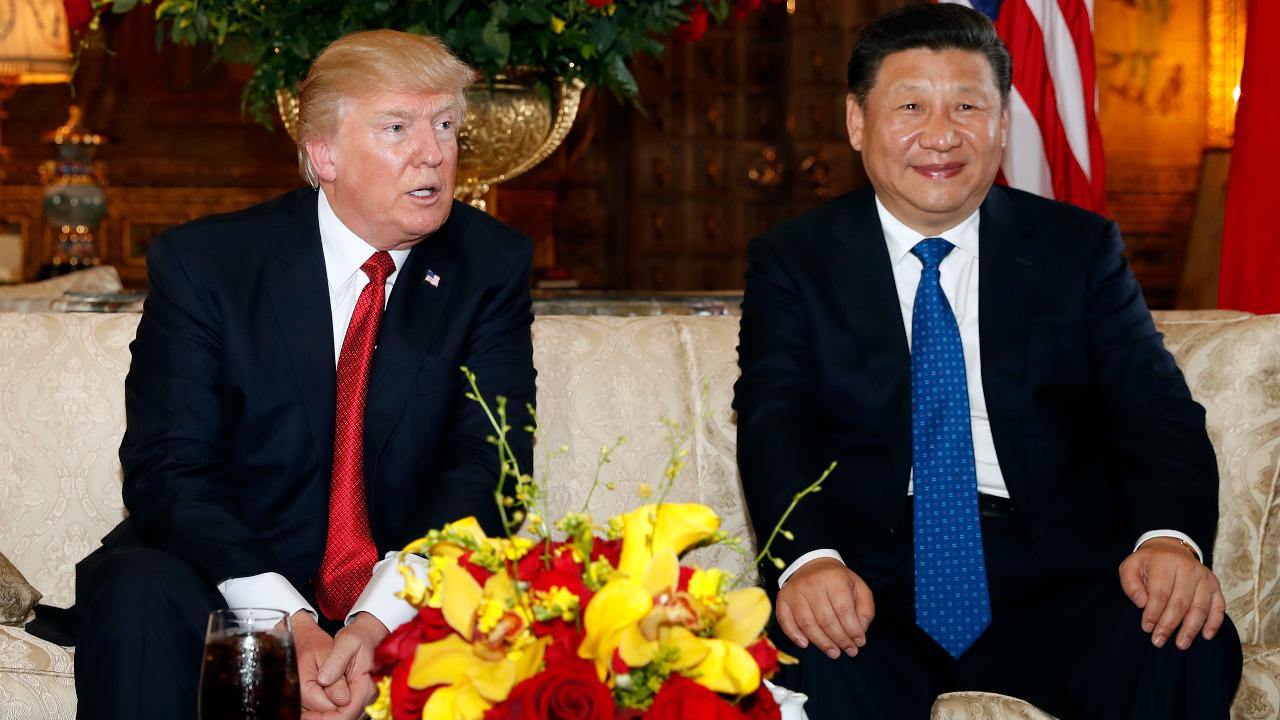Trump says China can't hurt American farmers: True or false?
President Trump tweeted Tuesday that “our great American Farmers know that China will not be able to hurt them.” But is that so?
Last week Trump ordered new 10 percent tariffs on about $300 billion in Chinese imports to begin September 1. China retaliated on Monday by devaluing its currency, the yuan, and instructing state firms to stop all purchases of U.S. farm goods.
Trump then had the Treasury Department officially declare China a “currency manipulator.” (Since Trump announced his first set of tariffs in March 2018 through this week, the Chinese yuan has been devalued precisely 10 percent. However Beijing showed signs of easing the pace of the fall on Tuesday, which calmed investors as stocks began to rebound from Monday's declines in early trading.)
Here is who stands to win and lose amid the latest round of tit-for-tat trade battling between the world’s two largest economies.
Winners

Woman counts her money while shopping. (iStock)
U.S. consumers and Chinese manufacturers: The devaluation is good news for Chinese producers and U.S.consumers. If the Chinese allow the yuan to keep falling, it could theoretically undo the effect of all the tariffs. Consumers would see the same prices they did before the tariffs were imposed.

Apple CEO Tim Cook attends the first meeting of the American Workforce Policy Advisory Board with US President Donald Trump in the State Dining Room of the White House in Washington, DC, March 6, 2019. (Photo by SAUL LOEB / AFP) (Photo credit should
Apple: Although Apple shares slid 5.2 percent yesterday, it will be a significant beneficiary of the currency devaluation. Last week analysts were warning that Trump’s newly proposed tariffs would hurt demand for the iPhone and raise the price by as much as $100 each. Now, with the yuan devaluation, Apple will not have to raise prices or lower its profits. It will also be more competitive in China, in that with the lower yuan an iPhone will be cheaper to make.
| Ticker | Security | Last | Change | Change % |
|---|---|---|---|---|
| AAPL | APPLE INC. | 274.62 | -3.24 | -1.17% |
Losers

A farmer drives a tractor with a "Trump, Keep America Great," flag, Tuesday, May 21, 2019, in Warrenton, Mo. Trump won the presidency by winning rural America, in part by pledging to use his business savvy and tough negotiating skills to take on Chin (AP)
U.S. farmers: Despite Trump’s tweet, American farmers now stand to lose all of what was a $9.1 billion market in 2018,which was down sharply from the $19.5 billion U.S. farmers exported to China in 2017. China’s new agricultural ban has an additional benefit to the Chinese of maximizing negative political impact to Trump.
Important presidential election swing states in the Midwest grain belt such as Iowa and Wisconsin were vital to his 2016 election victory. Cutting this particular area of bilateral trade at a time when American farmers are recovering from the after-effects of this year’s floods is a potent way for Beijing to punch back against President Trump’s new tariffs.
Germany and Europe: The cheaper yuan will make it even harder for European manufacturers, and especially Germany’s export-oriented economy, to compete.
Some Chinese companies: Many of China’s largest and most indebted companies in sectors like property and heavy industry have borrowed massive amounts overseas in American dollars. A weaker yuan makes paying that debt back more expensive. It could also hurt companies dependent on commodities, such as oil, that are priced in dollars. It could also encourage wealthy Chinese to take their money out of the country.
Too soon to tell

FILE - In this Feb. 14, 2019, file photo, Chinese staffers adjust U.S. and Chinese flags before the opening session of trade negotiations between U.S. and Chinese trade representatives at the Diaoyutai State Guesthouse in Beijing. Beijing on Friday,
Chinese government: A weaker currency can make Chinese goods cheaper to sell abroad both in the U.S. and internationally. It also harms American manufactured goods and makes then more expensive to sell in China.
U.S. chipmakers: Yesterday, selling was heavy in computer chipmakers, which generate significant revenue from sales to technology manufacturers based in China. Since American computer chips are important components in many Chinese electronic products, they will not be easy to replace. Most analysts believe Chinese tech firms will simply have to pay more for these U.S. products.
Paul Dietrich is the CEO and Chief Investment Officer of Fairfax Global Markets LLC, a Registered Investment Advisory firm. He is also an international corporate attorney and has been an advisor on privatization and economic development issues to the World Bank, as well as several governments in Asia, Eastern Europe and the former Soviet Union.




















